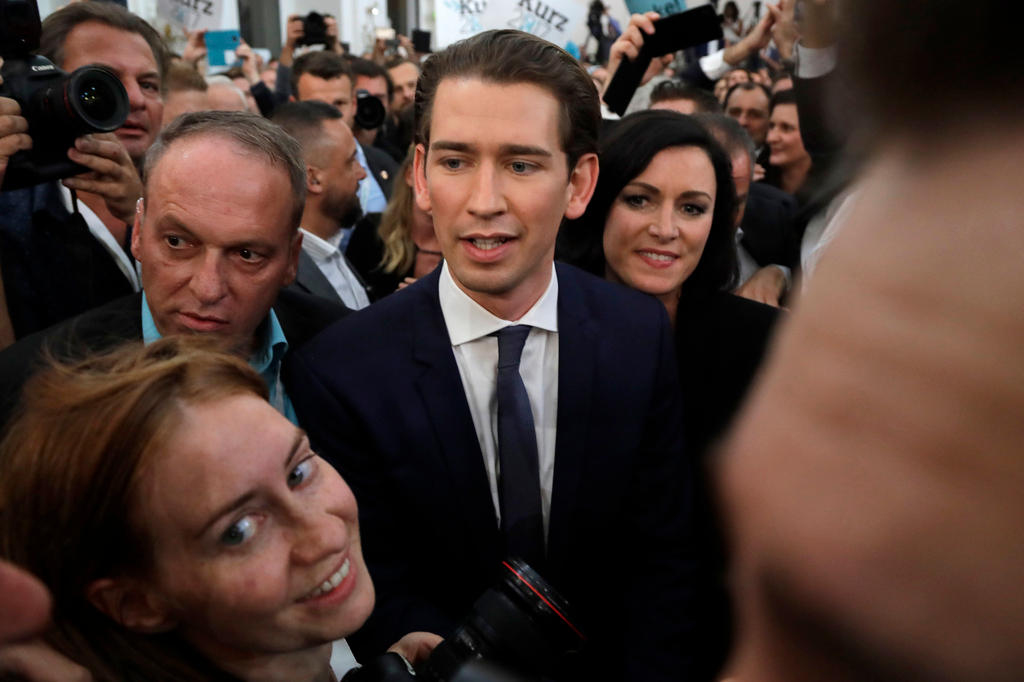Austria’s lurch to the right concerns Swiss papers

“Populism is the winner,” declared Zurich’s Tages-Anzeiger on Monday, the day after elections in Switzerland’s eastern neighbour resulted in a possible coalition between the conservative People’s Party and far-right Freedom Party.
Austria is not an isolated case here, the paper pointed out. “Xenophobia, Islamophobia and playing an evil game with fears of losing status are currently the political model in almost all of Europe,” it said in an editorial.
“What’s at least clear from the election in Austria is that no lasting remedy or effective antidote has been found for this rightwing populism.”
Foreign Minister Sebastian Kurz, who is just 31, managed to propel his People’s Party to first place by taking a hard line on immigration that left little space between it and the resurgent Freedom Party.
Both parties increased their share of the vote from the last parliamentary election in 2013, projections showed, marking a sharp shift to the right in the wake of Europe’s migration crisis. Chancellor Christian Kern’s Social Democrats were in a close race with the Freedom Party for second place.
“If one considers Austria as a sort of long-term lab experiment for populist rightwing activities, one can be afraid,” it said, noting that the country could look back on an “unusually long” history of rightwing politics.
“The People’s Party under Kurz has drifted to the right and succumbed to populism – and the price for that is high. For you don’t stop rightwingers by committing a sin yourself, but only by giving voters clear alternatives. Discussion and confrontation is necessary, not ingratiation.”
‘Out with the old’
Austria, a wealthy country of 8.7 million people, took in roughly 1% of its population in asylum seekers in 2015, one of the highest proportions on the continent. Many voters said they felt the country was overrun.
“An intense, bruising campaign has come to an end and the winners are clear: those on the political right and in particular Sebastian Kurz,” said the Neue Zürcher Zeitung (NZZ), adding that the young Viennese had used his “Machiavellian instinct for power” to manoeuvre himself to the head of the People’s Party and the party to election victory.
“Kurz managed to portray himself as the embodiment of renewal of Austria’s crusty old political system,” it said, echoing a headline in tabloid Blick: “Out with the old”.
From a democratic point of view, this intensification of personality in Austria was problematic, the NZZ added. “It illustrates the desire for a great liberation, which also harbours sympathies for an authoritarian style of politics.”
It would be unfair to blame Kurz for this, it reckoned, “yet he didn’t hesitate to make political capital out of it”.
The NZZ admitted that many of Kurz’s ideas, while not new, were correct – for example a more efficient administration, tax relief and giving the public a greater say – but he had to prove he could implement them, which would be all the more difficult with the Freedom Party as a coalition party.
“The hopes placed on Kurz are just as great as the potential for disappointment,” it concluded.

In compliance with the JTI standards
More: SWI swissinfo.ch certified by the Journalism Trust Initiative












You can find an overview of ongoing debates with our journalists here . Please join us!
If you want to start a conversation about a topic raised in this article or want to report factual errors, email us at english@swissinfo.ch.